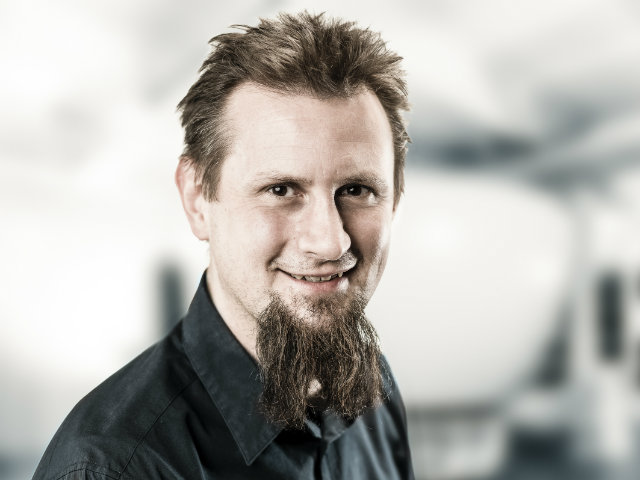How did you get into the aviation industry?
In 2005, while finishing a Telematics degree at Graz University of Technology in Austria, I started developing a console-based air traffic control simulator in my spare time. I’ve always been fascinated by the creativity involved in game software development, and was inspired by the landmark Flight Simulator programmes Microsoft launched back in 1982. From there I joined a group of home-cockpit builders at the Virtual Aviation Centre in Graz, where together we built an Airbus A320 cockpit integrated with that same flight simulator software. Building a simulator from the ground up was a complex undertaking, but it well and truly sparked my interest in aviation.
Tell us about your career so far.
I came to AXIS straight out of university, after meeting the company’s chief executive at the Virtual Aviation Centre while I was working on the A320 cockpit. When I learnt about AXIS’ plan to build a Fokker F100 full flight simulator I was desperate to be part of such an exciting project. I applied to the company as a software engineer and began working at AXIS in the spring of 2006.

AXIS Flight Training Systems
What is AXIS?
AXIS Flight Training Systems is an independent flight simulator manufacturer disrupting the training market by bringing first-class service and cutting-edge technology to our customers regardless of the size, age or location of their organisation. We are a young and dynamic company, providing reliable and robust products that are ahead of the curve with regards to smart and intuitive technology.
Tell us about your job.
I was appointed head of software development in 2014, and I now manage a team of six developers day to day. In the software development department we actively seek out employees that demonstrate raw intelligence, skill and a forward-looking perspective on new tech. This means the members of our team all come from very different backgrounds, from physics to web development – above all, we value the fresh insights that this diversity brings to our team.
What are you working on now?
Our team are presently working on interfacing an avionics system to the simulator software, as well as further progressing the diagnostic toolchain – all AXIS simulators have 24/7 online monitoring and predictive analytics, and this forms the backbone of the simulator’s operation. We are also developing the IOS, environmental sound and cockpit audio simulation, and the interface to the cockpit, as we strive for ever-more realism for both pilots and trainers.
How is simulator technology evolving?
At AXIS, we’ve always been focused on achieving realism for the pilots that use our products, and part of this is simulating avionics systems as accurately as possible. With the recent new avionics systems in modern airliners and the increasing complexity of these systems, finding a way to replicate these avionics is a key component of simulator technology today.
Another way simulator technology is evolving is through big data and data processing, so instructors can objectively assess the performance of their trainees. The need for online processing of flight parameters and pilot reactions, and finding a good way to display that information to instructors, is a key fact of today’s market.
What will simulators be like 10 years from now?
Since AXIS began developing its first full flight simulator in 2004, the technology involved has changed exponentially – so it’s almost impossible to imagine what simulators will be like another 10 years from now. To speak generally, there is a lot of interest in developing artificial intelligence in training at the moment, with machine-learning having a number of possible outcomes for simulator manufacturers.
What do you enjoy most about your job?
I’m proud to be a part of the relatively small circle of people worldwide (and an even smaller circle here in Austria) who have the chance to build full flight simulators, helping to improve pilot training and subsequently contribute to safer skies across the globe. It’s hugely exciting to be working at the forefront of new technologies, witnessing how they make a difference to the products that real people rely on, and use, every day.
What do you enjoy the least?
In Graz, it would have to be the few months of the year when I get snowed in. My commute can be tricky at times – but then, that’s a fairly universal complaint.
Search aerospace career opportunities now with Flight Jobs
Source: Flight International























